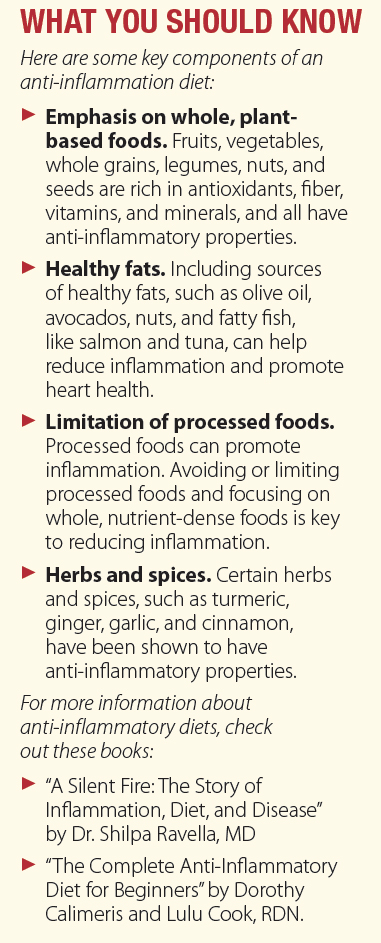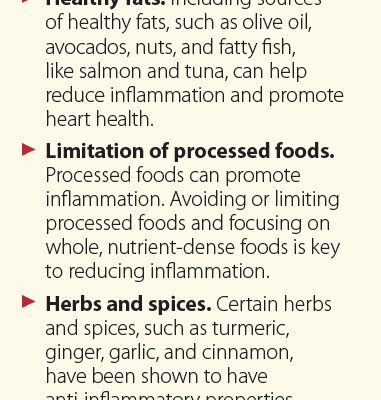Embrace an Anti-Inflammation Diet and Enjoy Better Health and Well-Being
Anti-inflammatory diets focus on whole, nutrient dense foods, while minimizing or eliminating processed foods, refined sugars, red meat, butter, and full-fat cheese. Some women follow this type of nutrition plan to combat chronic inflammatory conditions, which tend to be more prevalent in women. Others embrace an anti-inflammatory diet as part of a holistic approach to improve or maintain their overall health. Read on to learn about conditions and disorders that can benefit from an anti-inflammatory diet and how to modify your current diet to reap the benefits.
The Mediterranean diet, which originates from the countries bordering the Mediterranean Sea, including Greece, Italy, and Spain, is an excellent example of an anti-inflammatory diet. It is rich in fruits, vegetables, whole grains, legumes, nuts, and olive oil, and reflects the traditional foods and cooking styles of the Mediterranean region. “The Mediterranean diet is full of anti-inflammatory components. It’s rich in nonprocessed, whole foods such as colorful fruits and vegetables, whole grains, and heart-healthy oils,” says Gabrielle Gambino, MS, RD, a senior clinical dietitian at NewYork Presbyterian/Weill Cornell. While the Mediterranean diet is one of the most well-known anti inflammatory nutrition plans, Gambino points out that there are other geographic regions that are the source of cuisines rich in anti-inflammatory properties, as well. “For example, many Asian cultures regularly include whole fruits, vegetables, and healthful fats like sesame oils in their traditional recipes,” says Gambino.

Inflammation-Fighting Nutrition
Scientific research supports the effectiveness of an anti-inflammatory diet in improving chronic health conditions. Studies have shown that adopting an anti-inflammatory diet can lead to reductions in markers of inflammation, improvements in symptoms of inflammatory conditions such as rheumatoid arthritis and inflammatory bowel disease, and a lower risk of developing chronic diseases like heart disease, and diabetes. What’s more, the Mediterranean diet, specifically, has been consistently associated with a lower risk of cognitive decline and a reduced risk of Alzheimer’s disease. “It is actually very surprising how many conditions could be positively impacted by the food we eat. Inflammation is at the heart of many conditions, including heart disease, diabetes, arthritis, asthma, and even allergies,” says Gambino.
Conditions That Benefit from Reduced Inflammation
A diet built around ingredients with ant-inflammatory properties offers numerous benefits. Some of them are included here:
Chronic diseases: Chronic inflammation is a common factor in many diseases, including cardiovascular disease, diabetes, cancer, and autoimmune disorders. By reducing inflammation, an anti-inflammatory diet may help lower the risk of developing these conditions.
Gut health: A diet that focuses on whole, nutrient-dense foods can support a healthy gut microbiome, which is essential for digestion and nutrient absorption. This can lead to improved digestion and reduced risk of gastrointestinal disorders.
Chronic inflammation: For individuals with chronic inflammatory conditions such as rheumatoid arthritis, inflammatory bowel disease, or psoriasis, adopting an anti-inflammatory diet may help reduce symptoms and improve quality of life.
Weight management: A diet that emphasizes whole foods, lean proteins, healthy fats, and high-fiber carbohydrates can support weight management and reduce inflammation associated with excess body fat.
Improved energy and vitality: Chronic inflammation can contribute to feelings of fatigue and low energy. By reducing inflammation, an anti-inflammatory diet may help improve energy levels and promote better sleep.
Modify Your Current Diet
Even people who don’t have a chronic inflammatory disease can benefit from anti-inflammatory foods. “People tend to change their lifestyle after they’re faced with a condition or illness. But, anti-inflammatory diets can actually help prevent disease from happening. In that sense, we all could adapt to this diet and come out for the better,” says Gambino.
She stresses that simply modifying your current diet by embracing more anti-inflammatory foods can be beneficial. “I wouldn’t tell a patient or client to completely stop eating anything they love, but instead to eat less of the processed items and incorporate more plant-based foods, lean proteins, whole grains, and healthful fats like nuts, seeds, olive oil and canola oil,” she says.
Talk to Your Doctor About Diet Changes
While an anti-inflammatory diet can benefit many people, it’s essential to remember that individual responses to dietary changes vary, so it’s a good idea to consult with a health-care professional or registered dietitian before making significant changes to your diet, especially if you have any underlying health conditions, allergies, or dietary restrictions.
The post Embrace an Anti-Inflammation Diet and Enjoy Better Health and Well-Being appeared first on University Health News.
Read Original Article: Embrace an Anti-Inflammation Diet and Enjoy Better Health and Well-Being »


